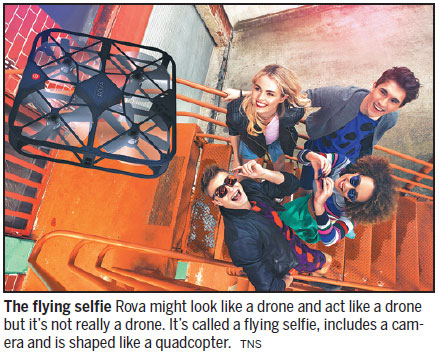These selfies are a real sendup
By Gregg Ellman in Chicago (China Daily) Updated: 2017-06-28 07:57Typically when I unbox a gadget to test, I use it until it does what it's supposed to or doesn't do it - either way it doesn't take that long. But after unboxing the Rova flying selfie, I couldn't wait for the batteries to recharge and use it again.
The Rova might look like a drone and act like a drone, but it's not really a drone. It's called a flying selfie, includes a camera, and is shaped like a quadcopter. It has a 30-meter communication range, via the Rova Wi-Fi network. Maximum height is 10 meters from launch.
A red button on the Rova gets it flying. Before I used it, I watched a video on the Rova site, where operators have it taking off and landing in the palm of your hand. That was the first landing I tried, and sure enough, there it was in my hand.

I rarely read manuals or instructions on gadgets (like everyone else) but I did this time, and I recommend that to anyone using a flying object since there are safety issues.
It's not as small and portable as a selfie stick, but it's certainly a lot more fun and provides a far great variety of images.
The camera has a wide-angle lens and image stabilization. Four propellers are enclosed in a polycarbonate frame, which you can use with or without bumpers.
The Rosa app (App Store and Google Play) controls the device, with settings for 12 megapixel JPEG photos or 360-degree HD video (MP4, 1080p@60fps, 1080p@30fps or 720p@120fps). Still, images can be taken automatically or with a specific timed interval, and there's a flash built into the camera.
Out of the box, it measures 20 by 20 by 3.56 cm and weighs 280 grams. Included are a hard carrying case, a 16GB microSD card, two lithium-ion batteries, charging cradle, USB cable, and four disposable bumpers. Each battery is good for about eight minutes of flight time, and recharges in 90 minutes.
Surface protection
Invisible Shield, an industry leader when it comes to protecting the display on many of today's portable electronic gadgets, has announced a new model for the slick-looking Galaxy S8 and S8+ smartphones with its edge-to-edge HDR display.
The Invisible Shield Sapphire Defense Curve and Glass Curve install in seconds and fit well with or without a case.
According to the company, the Sapphire Defense Curve ($59.99) is infused with sapphire crystals that provide a smooth, glassy feel, so you get unbeatable scratch protection. It's out of the box with easy-apply tabs and provides high-definition clarity along with seven times the shatter protection of an unprotected screen.
The Glass Curve ($49.99) goes edge-to-edge on the existing unprotected curved screen thanks to its well-designed composition. Once it's installed, the clarity makes you wonder if it's there.
Both protectors come with a limited lifetime warranty, so if it gets worn or damaged during the lifetime of your device, you get a new one.
According to a recent news release, "In 2016, adult smartphone users in the United States spent about $16 billion repairing or replacing a damaged phone with the average cost being $162." Knowing that, this is a great investment.
Tribune News Service
- 'Cooperation is complementary'
- Worldwide manhunt nets 50th fugitive
- China-Japan meet seeks cooperation
- Agency ensuring natural gas supply
- Global manhunt sees China catch its 50th fugitive
- Call for 'Red Boat Spirit' a noble goal, official says
- China 'open to world' of foreign talent
- Free trade studies agreed on as Li meets with Canadian PM Trudeau
- Emojis on austerity rules from top anti-graft authority go viral
- Xi: All aboard internet express











